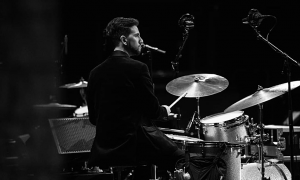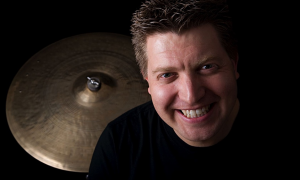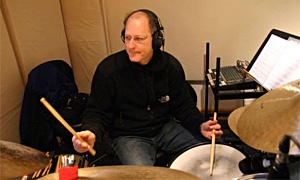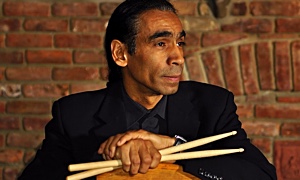Home » Jazz Articles » Rhythm In Every Guise » Tom Melito on Pete Malinverni's "Invisible Cities"
Tom Melito on Pete Malinverni's "Invisible Cities"
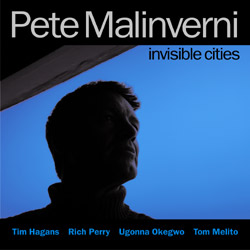 Throughout the ten tracks of Invisible Cities, Pete Malinverni's beautifully conceived and executed disc on the Reservoir Music imprint, Tom Melito's drumming is based on a certain amount of restraint and the capacity to meld into everything that goes on around him. Melito's unusually refined approach to the instrument is a refreshing change from the legion of contemporary trapsters who are loud and assertive to the point of insensitivity. Because his drumming is straightforward and self-effacing rather than cluttered and clamorous, you often have to listen carefully to grasp his impact on Malinverni's music. Every stroke is meticulously placed. Sometimes you don't hear him clearly on every measure, yet the pulse he establishes in concert with bassist Ugonna Okegwo is firm. Melito sounds quite comfortable in a circumscribed role, even when it means playing a part that entails little or no improvisation. He always does what's right for the music, and no more.
Throughout the ten tracks of Invisible Cities, Pete Malinverni's beautifully conceived and executed disc on the Reservoir Music imprint, Tom Melito's drumming is based on a certain amount of restraint and the capacity to meld into everything that goes on around him. Melito's unusually refined approach to the instrument is a refreshing change from the legion of contemporary trapsters who are loud and assertive to the point of insensitivity. Because his drumming is straightforward and self-effacing rather than cluttered and clamorous, you often have to listen carefully to grasp his impact on Malinverni's music. Every stroke is meticulously placed. Sometimes you don't hear him clearly on every measure, yet the pulse he establishes in concert with bassist Ugonna Okegwo is firm. Melito sounds quite comfortable in a circumscribed role, even when it means playing a part that entails little or no improvisation. He always does what's right for the music, and no more.
Malinverni's lively arrangement of the standard, "I Love Paris," the disc's opening track, is a good place to begin to appreciate some of Melito's virtues. During the introduction he executes a chattering Latin rhythm to the bell of a cymbal as well as repeated rim knocks and hits to the tom-toms. The cyclical pattern is both eloquent and a little hard to pin down. When Malinverni begins to play the melody the drummer's rhythmic stew becomes a bit thicker. The tom-toms pop in and out of the piano's notes and Okegwo's sturdy vamp. Melito's drumming serves as an edgy footing to the pianist's solo and a turn by tenor saxophonist Rich Perry. During Malinverni's improvisation, Melito recasts the same elements while maintaining continuity and the overall feel. While he executes variations to the cymbal beat, for awhile the tom-toms are in the foreground; later on the rim knocks stand out.
A restrained side of Melito's drumming and his ability to develop accompaniment in a subtle manner comes into play on Malinverni's funereal composition, "New Orleans—Cities & Desire." As the tune is taken at a glacial tempo in three-four time, he repeats a march-like beat consisting mostly of a hit to the bass drum, a pair of strokes to the snare, a wispy impression on a cymbal, and a buzz roll. Possessing a military bearing, it's a fitting match for Malinverni's somber melody. He briefly shelves the pattern on the bridge in favor of nearly inaudible strokes to the cymbal on each beat. During Okegwo's solo the primary rhythm is abandoned, the cymbal's ping is sharper and more clearly defined, and Melito adds the occasional accent to the snare and bass drums. For the most part the same minimalist approach applies to Tim Hagans' trumpet solo. On Malinverni's improvisation Melito often augments the steady ping with somewhat fuller, more rounded cymbal sounds.
Okegwo and Melito play an unusual two bar ostinato (one bar in five-four time, and one in three-four time) throughout a four minute performance of Malinverni's composition "Cities & Time." While Okegwo's every note rings true, the drummer contributes to the persistent, chugging pattern in ways that aren't always easy to discern. Melito positions himself deep in the music's core, and for the most part he's more felt than heard. Early on, you hear snatches of a steady ride cymbal and snare accents tailored to the ostinato's contours. The snare strokes are more clearly articulated when the band slows down to a crawl at the end of the track.
Melito evinces an unpretentious mastery of both Latin and straight-ahead jazz grooves on Malinveri's "Istanbul." During the "A" sections of the head his percolating Latin-oriented rhythms entail a combination of rim knocks, hits to the snare drum with the snares off, and sporadic kicks to the tom-toms and bass drum. Melito's comping on the jazz time that undergirds Malinverni's and Hagans' solos feels just right. His neat ride cymbal locks tightly into Okegwo's walking line and they generate a seemingly effortless swing which runs deep. While maintaining the meticulous ride cymbal beat, Melito exhibits a knack for landing snare and bass accents at key points in Malinverni's phrases. The snare and bass combinations behind Hagans are punchier and often override the cymbal's prominence. At a few points, three and four stroke tom-tom fills slip slide their way between the trumpeter's thoughts.
A stick and a brush make the faintest impression on "A City Called Heaven," the disc's final track. Steady taps to the ride cymbal and infrequent accents lightly support the band during Malinverni's lovely melody and solos by the pianist and Okegwo. Articulate in an unassuming way, Melito's discrete, selfless accompaniment is exactly what the music requires.
Tags
PREVIOUS / NEXT
Support All About Jazz
 All About Jazz has been a pillar of jazz since 1995, championing it as an art form and, more importantly, supporting the musicians who make it. Our enduring commitment has made "AAJ" one of the most culturally important websites of its kind, read by hundreds of thousands of fans, musicians and industry figures every month.
All About Jazz has been a pillar of jazz since 1995, championing it as an art form and, more importantly, supporting the musicians who make it. Our enduring commitment has made "AAJ" one of the most culturally important websites of its kind, read by hundreds of thousands of fans, musicians and industry figures every month.









